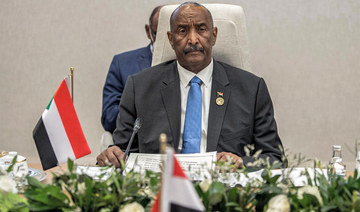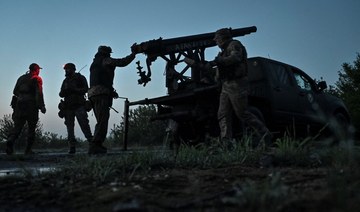PARIS: France’s Interior Ministry said Saturday that 1,311 people were arrested around the country during a fourth night of riots triggered by the deadly shooting of a 17-year-old by police.
The government deployed 45,000 police around the country to try to quell violence. Overnight young protesters clashed with police, set some 2,500 fires and ransacked stores.
The funeral ceremony for Nahel, who was killed by police in the suburb of Nanterre on Tuesday, began Saturday with a visitation, to be followed by a mosque ceremony and burial in a cemetery there.
Rioting raged in cities around France for a fourth night despite massive police deployment, with cars and buildings set ablaze and stores looted, as family and friends prepared Saturday to bury the 17-year-old whose killing by police unleashed the unrest.
The government suggested the violence was beginning to lessen thanks to tougher security measures, but damages remained widespread, from Paris to Marseille and Lyon and French territories overseas, where a 54-year-old died after being hit by a stray bullet in French Guiana. The interior ministry announced 994 arrests around France by early Saturday.
France’s national soccer team — including international star Kylian Mbappe, an idol to many young people in the disadvantaged neighborhoods where the anger is rooted — pleaded for an end to the violence.
“Many of us are from working-class neighborhoods, we too share this feeling of pain and sadness” over the killing of 17-year-old Nahel, the players said in a statement. “Violence resolves nothing. … There are other peaceful and constructive ways to express yourself.”
They said it’s time for “mourning, dialogue and reconstruction” instead.
The fatal shooting of Nahel, whose last name has not been made public, stirred up long-simmering tensions between police and young people in housing projects who struggle with poverty, unemployment and racial discrimination. The subsequent rioting is the worst France has seen in years and puts new pressure on President Emmanuel Macron, who appealed to parents to keep children off the streets and blamed social media for fueling violence.
Family and friends were holding a funeral gathering Saturday for Nahel in his hometown of Nanterre. Anger erupted in the Paris suburb after his death there Tuesday and quickly spread nationwide.
Early Saturday, firefighters in Nanterre extinguished blazes set by protesters that left scorched remains of cars strewn across the streets. In the neighboring suburb Colombes, protesters overturned garbage bins and used them for makeshift barricades.
Looters during the evening broke into a gun shop and made off with weapons in the Mediterranean port city of Marseille, police said. Officers in Marseille arrested nearly 90 people as groups of protesters lit cars on fire and broke store windows to take what was inside.
Buildings and businesses were also vandalized in the eastern city of Lyon, where a third of the roughly 30 arrests made were for theft, police said. Authorities reported fires in the streets after an unauthorized protest drew more than 1,000 people earlier Friday evening.
The Interior Ministry said 994 arrests were made during the night, with more than 2,500 fires. The night before, 917 people were arrested nationwide, 500 buildings targeted, 2,000 vehicles burned and dozens of stores ransacked.
While the number of overnight arrests was the highest yet, there were fewer fires, cars burned and police stations attacked around France than the previous night, according to the Interior Ministry. Interior Minister Gerald Darmanin claimed the violence was of “much less intensity.”
Hundreds of police and firefighters have been injured, including 79 overnight, but authorities have not released injury tallies for protesters.
Nanterre Mayor Patrick Jarry said France needs to “push for changes” in disadvantaged neighborhoods.
Despite repeated government appeals for calm and stiffer policing, Friday saw brazen daylight violence, too. An Apple store was looted in the eastern city of Strasbourg, where police fired tear gas, and the windows of a fast-food outlet were smashed in a Paris-area shopping mall, where officers repelled people trying to break into a shuttered store, authorities said.
In the face of the escalating crisis that hundreds of arrests and massive police deployments have failed to quell, Macron held off on declaring a state of emergency, an option that was used in similar circumstances in 2005.
Instead, his government ratcheted up its law enforcement response, with 45,000 police deployed overnight. Some were called back from vacation.
Darmanin ordered a nationwide nighttime shutdown Friday of all public buses and trams, which have been among rioters’ targets. He also said he warned social networks not to allow themselves to be used as channels for calls to violence.
“They were very cooperative,” Darmanin said, adding that French authorities were providing the platforms with information in hopes of cooperation identifying people inciting violence.
“We will pursue every person who uses these social networks to commit violent acts,” he said.
Macron, too, zeroed in on social media platforms that have relayed dramatic images of vandalism and cars and buildings being torched. Singling out Snapchat and TikTok, he said they were being used to organize unrest and served as conduits for copycat violence.
The violence comes just over a year before Paris and other French cities are due to host 10,500 Olympians and millions of visitors for the summer Olympic Games. Organizers said they are closely monitoring the situation as preparations for the Olympics continue.
The police officer accused of killing Nahel was handed a preliminary charge of voluntary homicide. Preliminary charges mean investigating magistrates strongly suspect wrongdoing but need to investigate more before sending a case to trial. Nanterre prosecutor Pascal Prache said his initial investigation led him to conclude that the officer’s use of his weapon wasn’t legally justified.
Nahel’s mother, identified as Mounia M., told France 5 television that she was angry at the officer but not at the police in general. “He saw a little Arab-looking kid, he wanted to take his life,” she said.
“A police officer cannot take his gun and fire at our children, take our children’s lives,” she said. The family has roots in Algeria.
Race was a taboo topic for decades in France, which is officially committed to a doctrine of colorblind universalism. In the wake of Nahel’s killing, French anti-racism activists renewed complaints about police behavior.
Thirteen people who didn’t comply with traffic stops were fatally shot by French police last year. This year, another three people, including Nahel, died under similar circumstances. The deaths have prompted demands for more accountability in France, which also saw racial justice protests after George Floyd’s killing by police in Minnesota.
This week’s protests echoed the three weeks of rioting in 2005 that followed the deaths of 15-year-old Bouna Traoré and 17-year-old Zyed Benna, who were electrocuted while hiding from police in a power substation in Clichy-sous-Bois.
France arrests more than 1,300 people after fourth night of rioting over teen’s killing by police
https://arab.news/nu4wn
France arrests more than 1,300 people after fourth night of rioting over teen’s killing by police
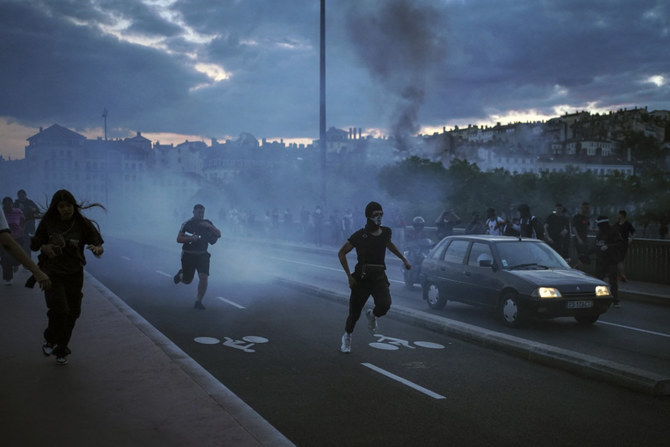
- French minister says police made 471 arrests Friday night, in addition to 917 on Thursday
- More than 300 cops, firefighters injured in clashes, number of officers deployed raised to 45,000
UN asks South Sudan to remove new taxes that led to a pause in food airdrops
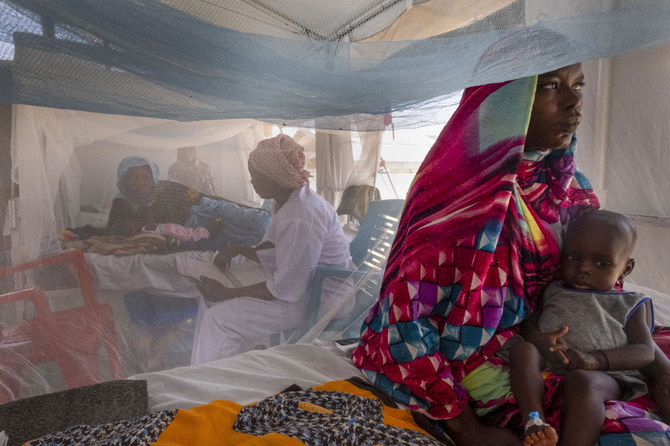
- UN said that pausing of airdrops in March had deprived of food 60,000 people who live in areas that are inaccessible by road
JUBA: The United Nations has urged South Sudan to remove newly imposed taxes and charges that led to the suspension of UN food airdrops for thousands of people who depend on outside aid.
The UN Humanitarian Affairs Agency said Monday in a statement that the pausing of airdrops in March had deprived of food 60,000 people who live in areas that are inaccessible by road, and their number is expected to rise to 135,000 by the end of May.
The UN said the new charges would have increased operational costs to $339,000 monthly, which it says is enough to feed over 16,300 people. The new charges introduced in February are related to electronic cargo tracking, security escort fees and new taxes on fuel.
“Our limited funds are spent on saving lives and not bureaucratic impediments,” Anita Kiki Gbeho, the UN humanitarian coordinator for South Sudan, said.
UN spokesman Stéphane Dujarric said in New York that the taxes and charges are also impacting the nearly 20,000-strong UN peacekeeping mission in South Sudan, “which is reviewing all of its activities, including patrols, the construction of police stations, schools and health care centers, as well as educational support.”
The UN says the South Sudan government had said it would remove the new charges and taxes but had not committed to it in writing since February.
An estimated 9 million people out of 12.5 million people in South Sudan need protection and humanitarian assistance, according to the UN The country has also seen an increase in the number of people fleeing the war in neighboring Sudan, further complicating humanitarian assistance to those affected by the internal conflict.
French police remove pro-Palestinian students from the courtyard of Sorbonne university in Paris
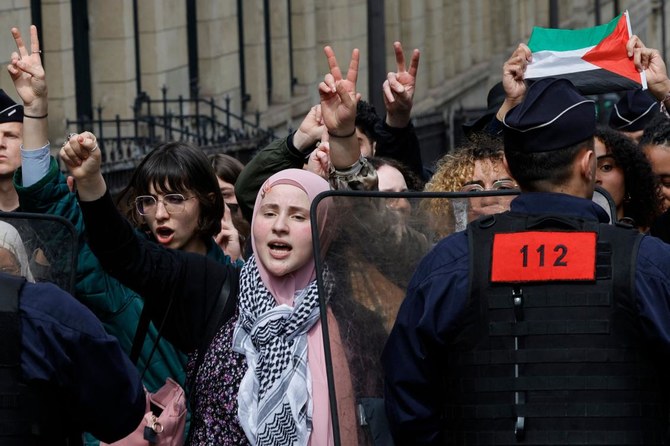
- About 50 protesters set up tents at midday Monday at the elite university’s courtyard
PARIS: French police removed dozens of students from the Sorbonne university after pro-Palestinian protesters occupied the main courtyard of the elite institution in Paris on Monday.
About 50 protesters set up tents at midday Monday at the Sorbonne university courtyard in support of Palestinians, echoing similar encampments and solidarity demonstrations across the United States.
Protesters unveiled a giant Palestinian flag and chanted slogans in support of Palestinians in Gaza, as Israel continues its offensive following the deadly Oct. 7 Hamas attack that triggered the Israeli-Hamas war. Police entered the university grounds in the early afternoon and removed them.
About 100 demonstrators took part in the protest near the prestigious university amid heavy police presence that were also guarding the university entrance to prevent students from setting up camp inside again.
Lorelia Frejo, a graduate student at the Sorbonne who joined a protest outside the university, said police used force to remove her peers from the courtyard. “They were peaceful and police took them out with no explanation,” Frejo said. Students in Paris were inspired by the protests at New York’s Columbia University who remain steadfast despite police pressure, she added.
“They (Columbia protesters) are very strong and want to fight for justice and for peace in Palestine,” Frejo said.
The Sorbonne occupies a unique place at the heart of French public and intellectual life. Last week, President Emmanuel Macron chose it as the venue to deliver a speech on his vision of Europe ahead of elections for the European Parliament in June.
Last week protests broke out at another elite university in the French capital region, the Paris Institute of Political Studies, known as Sciences Po, which counts Macron and Prime Minister Gabriel Attal among its many famous alumni.
Tensions had broken out on campus as pro-Palestinian students inspired by Gaza solidarity encampments at campuses in the United States sought to occupy an amphitheater.
On Friday, pro-Palestinian and pro-Israeli demonstrators faced each other in a tense standoff in the street outside the school. Riot police stepped in to separate the opposing groups.
The protest ended peacefully, when students agreed to evacuate the building late on Friday. The head of Sciences Po said an agreement with students had been reached.
Afghan Taliban’s treatment of women under scrutiny at UN rights meeting
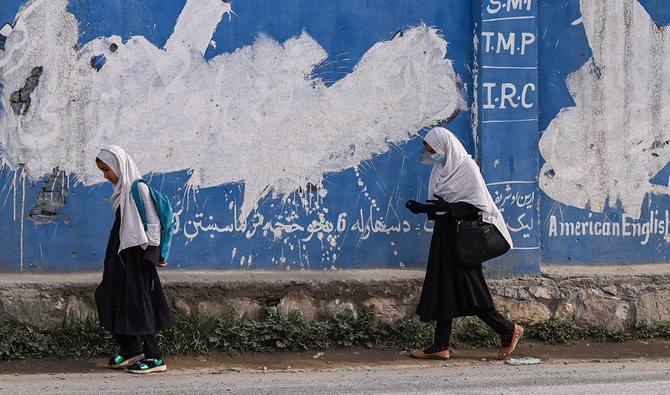
- The Taliban say they respect rights in line with their interpretation of Islamic law
- Taliban have barred girls from high school and women from universities and jobs
GENEVA: Afghanistan’s Taliban face criticism over their human rights record at a UN meeting on Monday, with Washington accusing them of systematically depriving women and girls of their human rights.
However, in an awkward first for the UN Human Rights Council, the concerned country’s current rulers will not be present because they are not recognized by the global body.
Afghanistan will instead be represented by an ambassador appointed by the previous US-backed government, which the Taliban ousted in 2021.
In a series of questions compiled in a UN document ahead of the review, the United States asked how authorities would hold perpetrators to account for abuses against civilians, “particularly women and girls who are being systematically deprived of their human rights“?
Britain and Belgium also raised questions about the Taliban’s treatment of women. In total, 76 countries have asked to take the floor at the meeting.
The Taliban say they respect rights in line with their interpretation of Islamic law.
Since they swept back into power, most girls have been barred from high school and women from universities. The Taliban have also stopped most Afghan female staff from working at aid agencies, closed beauty salons, barred women from parks and curtailed travel for women in the absence of a male guardian.
Under the US system, states’ human rights records are subject to peer review in public meetings of the Geneva-based Human Rights Council, resulting in a series of recommendations.
While non-binding, these can draw scrutiny of policies and add to pressure for reform.
The UN Human Rights Council, the only intergovernmental global body designed to protect human rights worldwide, can also mandate investigations whose evidence is sometimes used before national and international courts.
Indian students protest US envoy’s campus talk over Gaza war
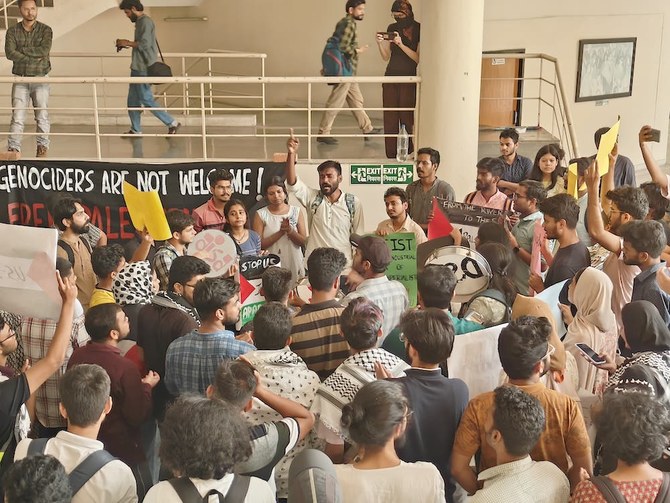
- Student-led protest led to university canceling an event involving US ambassador
- Indian students say they stand in solidarity with students protest across US
NEW DELHI: Students at one of India’s most prominent universities gathered in protest over an event involving the US ambassador to New Delhi on Monday, as they stood up against American support for Israel’s war on Gaza.
US Ambassador to India Eric Garcetti was invited for a talk on US-India ties at the Jawaharlal Nehru University in New Delhi on Monday afternoon, which would take place amid protests on American campuses demanding their universities cut financial ties with Israel over its military offensive in Gaza, which has killed more than 34,000 Palestinians.
At the university’s convention center, over 100 students organized by the Jawaharlal Nehru University Student Union protested the invitation of Garcetti, calling out his complicity “in the genocide Israel is currently doing in Palestine.”
JNUSU President Dhananjay told Arab News: “By calling such a person in the university … who is supporting the genocide, we want to tell them that JNU is not silent on this issue and we want to speak up.
“We are protesting against the US support for the genocide in Gaza committed by Israel.”
Hundreds of US college students have been arrested and suspended as peaceful demonstrations calling for a ceasefire in Gaza and divestment from companies linked to Israel spread across American campuses.
The student-led movement comes after nearly six months since Israel began its onslaught on the Gaza Strip, which Tel Aviv said was launched to stamp out the militant group Hamas.
Hundreds of thousands of housing units in the besieged territory have either been completely or partially destroyed, while the majority of public facilities, schools and hundreds of cultural landmarks have been demolished and continue to be targeted in intense bombing operations.
JNU student leaders said they stood in solidarity with the protesting students in the US.
“We are students, and we need to ask questions. If some atrocities are taking place and there are mindless killings going on, speaking out against this should be the responsibility of all sections of society,” Dhananjay said.
“The visuals that we see make us shiver and shake our conscience. If we don’t speak up, then I don’t think we have a right to be a social being.”
At the JNU campus on Monday, the student protest led to a cancellation of the event involving the US envoy.
“We feel happy that we forced the administration to cancel the talks by the ambassador,” JNUSU Vice President Avijit Ghosh told Arab News.
Despite India’s historic support for Palestine, the government has been mostly quiet in the wake of Israel’s deadly siege of Gaza.
When Indians went to the streets in the past months to protest and raise awareness on the atrocities unfolding in Gaza, their demonstrations were dispersed by police and campaigns stifled.
Members of Indian civil society have since come together to challenge their government’s links with Tel Aviv and break Delhi’s silence on Israel’s war crimes against Palestinians, reflecting similar concerns that some university students also felt.
“The US is supporting Israel in the killing of Palestinian people in Gaza. It’s also suppressing students in its country who are raising voice against the genocide in Gaza,” Ghosh said.
“We are agitated that India is being a mute spectator and not taking a clear stand against the ongoing genocide in Gaza.”
Ukraine’s Zelensky urges US to speed up weapons deliveries
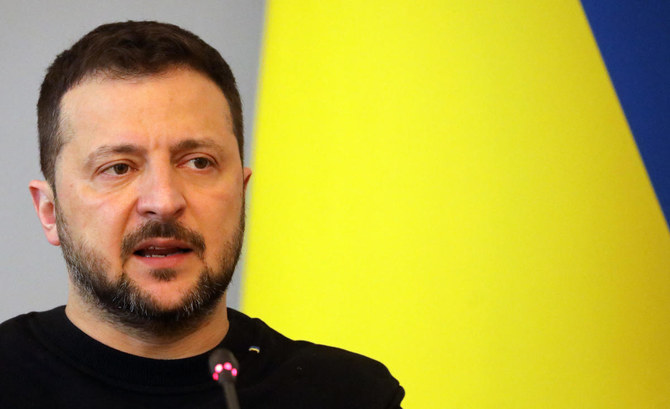
KYIV: President Volodymyr Zelensky said on Monday that vital US weapons were starting to arrive in Ukraine in small amounts and that the process needed to move faster as advancing Russian forces were trying to take advantage.
Zelensky told a joint news conference in Kyiv alongside visiting NATO chief Jens Stoltenberg that the situation on the battlefield directly depended on the speed of ammunition supplies to Ukraine.
“Timely support for our army. Today I don’t see anything positive on this point yet. There are supplies, they have slightly begun, this process needs to be sped up,” he said.




